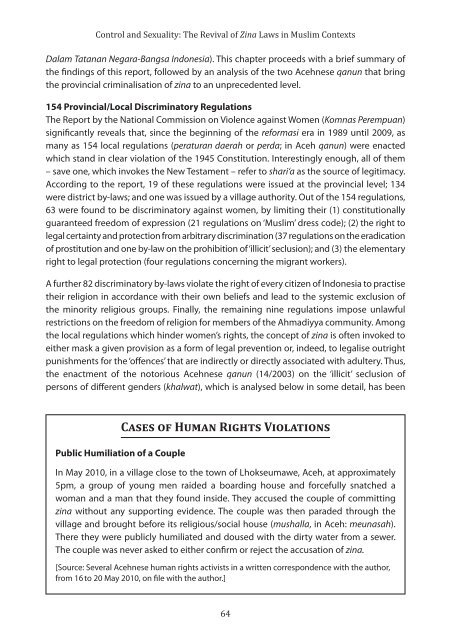control and sexuality
control and sexuality
control and sexuality
- No tags were found...
You also want an ePaper? Increase the reach of your titles
YUMPU automatically turns print PDFs into web optimized ePapers that Google loves.
Control <strong>and</strong> Sexuality: The Revival of Zina Laws in Muslim ContextsDalam Tatanan Negara-Bangsa Indonesia). This chapter proceeds with a brief summary ofthe findings of this report, followed by an analysis of the two Acehnese qanun that bringthe provincial criminalisation of zina to an unprecedented level.154 Provincial/Local Discriminatory RegulationsThe Report by the National Commission on Violence against Women (Komnas Perempuan)significantly reveals that, since the beginning of the reformasi era in 1989 until 2009, asmany as 154 local regulations (peraturan daerah or perda; in Aceh qanun) were enactedwhich st<strong>and</strong> in clear violation of the 1945 Constitution. Interestingly enough, all of them– save one, which invokes the New Testament – refer to shari‘a as the source of legitimacy.According to the report, 19 of these regulations were issued at the provincial level; 134were district by-laws; <strong>and</strong> one was issued by a village authority. Out of the 154 regulations,63 were found to be discriminatory against women, by limiting their (1) constitutionallyguaranteed freedom of expression (21 regulations on ‘Muslim’ dress code); (2) the right tolegal certainty <strong>and</strong> protection from arbitrary discrimination (37 regulations on the eradicationof prostitution <strong>and</strong> one by-law on the prohibition of ‘illicit’ seclusion); <strong>and</strong> (3) the elementaryright to legal protection (four regulations concerning the migrant workers).A further 82 discriminatory by-laws violate the right of every citizen of Indonesia to practisetheir religion in accordance with their own beliefs <strong>and</strong> lead to the systemic exclusion ofthe minority religious groups. Finally, the remaining nine regulations impose unlawfulrestrictions on the freedom of religion for members of the Ahmadiyya community. Amongthe local regulations which hinder women’s rights, the concept of zina is often invoked toeither mask a given provision as a form of legal prevention or, indeed, to legalise outrightpunishments for the ‘offences’ that are indirectly or directly associated with adultery. Thus,the enactment of the notorious Acehnese qanun (14/2003) on the ‘illicit’ seclusion ofpersons of different genders (khalwat), which is analysed below in some detail, has beenPublic Humiliation of a CoupleCases of Human Rights ViolationsIn May 2010, in a village close to the town of Lhokseumawe, Aceh, at approximately5pm, a group of young men raided a boarding house <strong>and</strong> forcefully snatched awoman <strong>and</strong> a man that they found inside. They accused the couple of committingzina without any supporting evidence. The couple was then paraded through thevillage <strong>and</strong> brought before its religious/social house (mushalla, in Aceh: meunasah).There they were publicly humiliated <strong>and</strong> doused with the dirty water from a sewer.The couple was never asked to either confirm or reject the accusation of zina.[Source: Several Acehnese human rights activists in a written correspondence with the author,from 16 to 20 May 2010, on file with the author.]64


